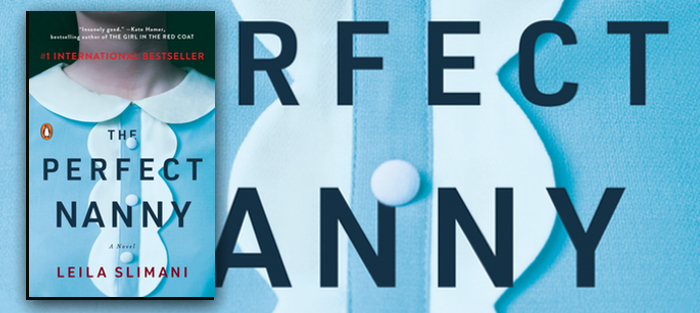The Perfect Nanny opens with the sentence “The baby is dead,” and the first chapter concludes, “Mila soon will be, too.” Sandwiched between these stark phrases is the gruesome description of a bathroom crime scene where a nanny has killed the two children in her care, only to have the mother return home to find them.
Published originally in French two years ago as Chanson Douce (meaning “Lullaby,” the novel in the U.K. translation), Leila Slimani’s second novel was inspired by the real-life New York case of a nanny who, in 2012, killed two young children in her charge. It’s a fact that nearly every media outlet has mentioned when reviewing the novel or interviewing the author, just as the coverage of the real-life case seemed unable to report on the tragedy without implying the mother’s culpability in the crime.
 But in many respects, this novel transcends sensationalism. It’s a fragmented thriller, social, domestic, and philosophical. From the throwdown opening sentence to the final scene, in which the female chief investigator dreads the fact that she has to reenact the crime playing the role of the nanny, this novel offers readers a complex and deeply uncomfortable emotional experience. The power of this page-turner hinges on a few crucial narrative choices: first, there is the reportage style, reflecting Slimani’s training as a journalist. Second, there is that horrifying opening chapter, which colors the rest of the novel, a loop through time, space, and perspectives. Third, there are the orbiting points of view from whom the tale is told. These include not only the mother, Myriam, a recent law school graduate turned stay-at-home mom, who begins her law career when their second child is a toddler, and the father, Paul, a bourgeois bohemian music producer, but also the nanny, Louise, whose abusive husband left her in impossible debt when he died, and Louise’s daughter, Stéphanie, a run-away. Additionally, we get the perspective of Louise’s confidante, a Moroccan nanny named Wafa, brought to France as a live-in escort then abandoned. Here and there, Slimani even includes a short chapter from a minor character’s point of view, which serves to further complicate Louise’s story and heighten suspense. Collectively, these points of view create a balancing act of culpability: no one is innocent in this novel, but no one—save Louise—is exactly guilty, either.
But in many respects, this novel transcends sensationalism. It’s a fragmented thriller, social, domestic, and philosophical. From the throwdown opening sentence to the final scene, in which the female chief investigator dreads the fact that she has to reenact the crime playing the role of the nanny, this novel offers readers a complex and deeply uncomfortable emotional experience. The power of this page-turner hinges on a few crucial narrative choices: first, there is the reportage style, reflecting Slimani’s training as a journalist. Second, there is that horrifying opening chapter, which colors the rest of the novel, a loop through time, space, and perspectives. Third, there are the orbiting points of view from whom the tale is told. These include not only the mother, Myriam, a recent law school graduate turned stay-at-home mom, who begins her law career when their second child is a toddler, and the father, Paul, a bourgeois bohemian music producer, but also the nanny, Louise, whose abusive husband left her in impossible debt when he died, and Louise’s daughter, Stéphanie, a run-away. Additionally, we get the perspective of Louise’s confidante, a Moroccan nanny named Wafa, brought to France as a live-in escort then abandoned. Here and there, Slimani even includes a short chapter from a minor character’s point of view, which serves to further complicate Louise’s story and heighten suspense. Collectively, these points of view create a balancing act of culpability: no one is innocent in this novel, but no one—save Louise—is exactly guilty, either.
But the tacit complicity that develops between Louise, Myriam, and Paul is where the finer balancing act of this novel—between horror and empathy—takes place. Myriam and Paul are both completely wrapped up in their careers, and it’s Louise who keeps the household running. The burden of this complicity is shouldered in practical terms by Louise, whose meager existence is barely maintained, and her material life completely deteriorates as the story advances. But Myriam also bears the burden of this complicity. Paul’s perspective gets relatively few pages in the novel, while Myriam’s anxiety and the implicit guilt heaped upon her for leaving her children to work comes up repeatedly; as Mila’s teacher says, “It’s the modern malaise. All these poor children are left to their own devices while both parents are obsessed with their careers.”
The “both” is of course crucial here; one parent would be fine, and who is it that’s hearing this accusation? The mother. Myriam fairly denounces these words as misogynistic. But she also slips into the stereotype: Louise spearheads an elaborate birthday party for Mila. As they await the guests, “Myriam holes up in her bedroom, closing the door and pretending to be absorbed in emails. She knows that, as always, she can depend on Louise.” Later, Myriam begins to look forward to the rare evening with her children like a rendezvous with a lover; however, Louise stays at their apartment, insistent upon making dinner and doing all the chores. And yet, “as the weeks pass, Louise becomes ever better at being simultaneously invisible and indispensable. Myriam no longer calls to warn her that she’s going to be late and Mila no longer asks when Mama is coming home. Louise is there, single-handedly holding up this fragile edifice.”
It is Paul who first grows tired of Louise’s officiousness and obsequiousness, but it’s not as if he’s prescient. Rather, Paul heaps his own misogyny and class prejudice on the nanny: “he can’t stand her anymore. With her doll’s body, her irritating habits, she really gets on his nerves.” This comes during the family vacation to the Greek Islands: “Mila mocks her: ‘Louise is a baby. She doesn’t even know how to swim.’ Paul is embarrassed… [he] blames Louise for having brought her poverty… For having poisoned their day with her martyr’s face.” That evening at dinner, Paul shows up with a gift for Louise:
“Here you go,” he says. The two women do not respond and Louise docilely holds up her arm so Paul can slide an inflatable armband past her elbow. “You’re so thin, you can even wear children’s armbands!”
Paul tries to redeem his behavior by teaching Louise how to swim. But after their return, when the Massés are contacted about Louise’s unpaid taxes, Paul berates her and threatens to fire her. Myriam, meanwhile, offers to help her straighten the matter out.
It’s in Louise’s penury that we see another facet of the complicity between mother and nanny: throughout the novel, Louise fixes hems, sews on loose buttons, soaks stains from clothes that “Myriam was about to throw out without a qualm.” Near the end of the novel, Myriam returns home from work late one night to find a perfectly cleaned chicken skeleton sitting on a platter on the dining table. She knows it must be the whole chicken she threw out early that morning, because she was afraid the meat had turned. When she asks Mila about the chicken carcass, the daughter
was laughing and jumping around as she explained how Louise had taught them to eat with their fingers. Standing on their chairs, she and Adam had scratched away at the bones. The meat was dry and Louise let them drink big glasses of Fanta as they ate, so they wouldn’t choke… And when it was over, they were allowed to eat two lemon drops as a special treat.
This is the conclusion of one chapter. The one that follows is from the perspective of a teenage boy in a different family, to whom Louise was nanny for many years. He and his mother have been called in for questioning after the murders; the subtext of this chapter is “it could have been me,” and in his mother’s reactions, “it could have been my children”— which ratchets up the tension even further before we return to Myriam’s perspective in the following chapter. She is in bed, obsessing over the chicken carcass. She calls Paul at work. Though rather than echoing her alarm, he tells her she’s overreacting. “It’s the like the script of a bad horror film, he laughs… Myriam hangs up on him. He tries to call her back but she doesn’t answer.”
While both Myriam and Paul have concerns about Louise, they are distracted from their worry by work and life. The nanny does so much for them—they can’t imagine how they could manage without her. And here we run into the class prejudice and complicity in cheap labor practices: Paul compliments Myriam for hiding new clothes in an old cloth bag so that Louise won’t see them. When Paul asks Louise to join in a dinner party with their friends, Louise tries to be a part of the conversation, but quickly slips in to giving advice to a young mother, then begins clearing the table when the dinner is finished. Paul, drunk, invites her to join them again on vacation: “‘You have to enjoy life, right?’ Louise, a pile of plates in her hands, smiles.”
Complicity is what in fact makes The Perfect Nanny a thriller. While both the novel and Slimani herself have been much lauded, some scholarly commentary suggests that Slimani—as a writer of both French and Moroccan origins, who was raised in Morocco and attended French schools—has turned her back on political issues. In the words of Khalid Lyamlahy at World Literature Today, Slimani’s tone toward immigrants in France is “laconic…it tackles the politics of identity and difference in a reductive, poorly creative, and sometimes unnecessarily violent or ambiguous way.” But if Slimani takes a laconic tone toward immigrants in the novel, we also find in the novel a similar reportage style that indirectly comments on the easy acceptance of cheap labor and goods for convenience and comfort. Furthermore, the scenes in which Myriam is guilt-tripped by teachers and mother-in-law alike, and placed on a pedestal by her boss, Pascal, are delivered neutrally. Yet behind these scenes and many others beats the constant drum: the mother left her children with a nanny. Lyamlahy is right that as a narrative, The Perfect Nanny is at moments as base as Paul’s behavior toward Louise in its portrayal of immigrants. But the narrative’s complicity with these social injustices is part of the point, and it’s horrifying.
This horror dovetails with the implicit guilt laid at Myriam’s feet as the mother. Note the philosophical gambit of the novel laid out in one of the epigraphs, a quotation from Crime and Punishment: “Do you understand, dear sir, do you understand what it means when there is absolutely nowhere to go? […] For every man must have somewhere to go.” Myriam became unsatisfied as a stay-at-home mother, and she decided to return to work. She and Paul both became completely dependent on Louise’s childcare and domestic support, but society lays the onus squarely on Myriam’s shoulders for depending upon a nanny to keep their lives afloat. I recall shaking my head at a similar, implicit burden placed upon the real-life mother whose children were killed by their nanny in the case that inspired Slimani’s novel. Consider the New York Times reporting:
Though Ms. Krim did not work outside the home, Mr. Krim’s parents said, they wanted a nanny to help out. Sometimes, Ms. Krim would take the two oldest children out with her, leaving the youngest with Ms. Ortega, whom they called Josie.
An acquaintance of Mr. Krim said he had been extremely happy in California and often lamented the difficulties of family life in New York and how it was necessary for a big family to have help.
Mr. Krim’s mother, Karen Krim, said Ms. Krim was a hands-on mother. “They’re both very careful,” she said. “She didn’t even leave the kids that much alone with this nanny; that’s the irony of all this.”
She added: “She didn’t have a nanny so she could go out and play tennis — not that there’s anything wrong with that. But she was always with the kids, and Josie just helped her because, with three little kids, it’s really hard.”
Although the article earlier details the father’s professional trajectory, nowhere does anyone implicitly defend the father against the idea that he may have played a role in the children’s death. The mother, on the other hand: she has some explaining to do.
There have been several conversations in the literary community this past fall about a term that Jenny Offill coined in her novel Department of Speculation, the “art monster,” a person who privileges his or her art above all else, including parenthood. The Perfect Nanny offers a fascinating companion read to Offill: in one chapter of Slimani’s novel, we see Myriam engrossed in her work as a lawyer, a variation on the art monster:
She forgets everything and plunges with relish into the examination of her dossiers. [Always the first there… alone in the office before eight], sometimes she walks through the dark corridor, document in hand, and talks to herself. She smokes a cigarette on the balcony as she drinks her coffee.
In Slimani’s novel, the burden placed upon women to care for children balances alongside the treatment and perceptions of immigrant women. And rendering these issues to subtext, rather than treating them head-on and politically, the narrative forces the reader to become complicit in the shoddy treatment of others for the sake of convenience and creature comforts. If Myriam and Paul had hired one of the other women they interviewed, would their children be dead? If they had treated Louise with more respect or paid her more, would she still have cracked? But most centrally: what if Myriam had never gone back to work, or at least waited until the children reached school age?
 Throughout The Perfect Nanny, the narrative remains calmly, frighteningly detached. And yet in the layering of details (such as Paul and Myriam’s dependence on Louise, Myriam’s return to and passion for her work, and the difference between the family’s and Louise’s perspective on how much and what is disposable), and what goes untold (we never see Paul at work; his commitment to his work is a given), two critiques are insinuated. First there is the imbalance between Myriam’s and Paul’s culpability as working parents, revealed in what Slimani shows in their social experiences as both professionals and parents. Second, in the subtextual detailing of consumption and waste, immigration and low-wage domestic workers, the novel insinuates that a nanny who kills her young charges may be the logical result of a society complicit in the poor remuneration and marginalization of the vulnerable so that the powerful can have it all. I won’t say that you should read The Perfect Nanny. But this novel offers a far more sophisticated and compelling reading experience than its American title and cover image suggest.
Throughout The Perfect Nanny, the narrative remains calmly, frighteningly detached. And yet in the layering of details (such as Paul and Myriam’s dependence on Louise, Myriam’s return to and passion for her work, and the difference between the family’s and Louise’s perspective on how much and what is disposable), and what goes untold (we never see Paul at work; his commitment to his work is a given), two critiques are insinuated. First there is the imbalance between Myriam’s and Paul’s culpability as working parents, revealed in what Slimani shows in their social experiences as both professionals and parents. Second, in the subtextual detailing of consumption and waste, immigration and low-wage domestic workers, the novel insinuates that a nanny who kills her young charges may be the logical result of a society complicit in the poor remuneration and marginalization of the vulnerable so that the powerful can have it all. I won’t say that you should read The Perfect Nanny. But this novel offers a far more sophisticated and compelling reading experience than its American title and cover image suggest.







